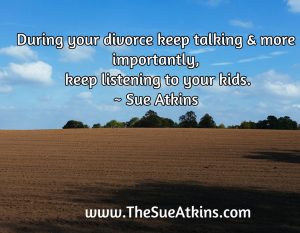


Like it? Share it!

Just as talking to your children is vital, no less important is the art of listening to them when they’re talking to you. Communicating effectively with your children can make your role as a parent simpler, more enjoyable and ultimately a more fulfilling experience and can ease the painful transition around all the changes happening during a divorce.
Truly listening is difficult, especially when you are a parent and maybe you’re feeling stressed and totally overwhelmed yourself during your divorce. Our natural reaction and tendency when our kids are having a difficult time is to want to fix things quickly and to take the hurt away.
But one of the most helpful things you can do is to really listen to your child which will support their feelings. This helps children to learn how to identify, accept and feel comfortable about expressing their feelings. It builds self-belief that they can handle difficult situations.
Here are some tips:
If you’d like to work with me as you go through your divorce call me on 01883 818329 or email me to arrange a time to chat on [email protected]
Discussing every possible aspect of parenting, giving you advice and support on topics which affect your daily life. Each free, weekly episode is bursting with practical tips, techniques and ideas.
I will teach you my no-nonsense, simple techniques & give you hundreds of my expert parenting articles, videos & podcasts so you can get back to the business of having fun with your family!



